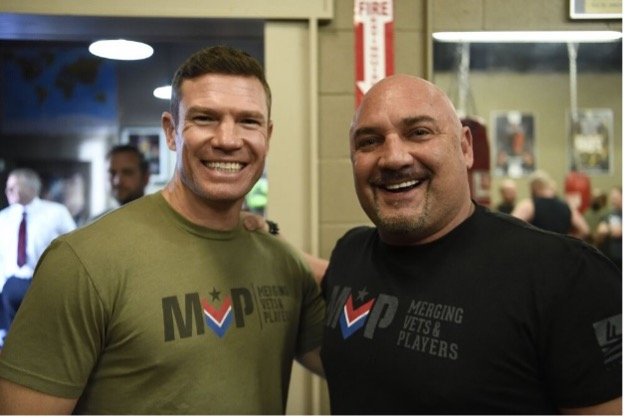TRUE NORTH SPOTLIGHT: MVP
By Leslie Parsons
Both the military and professional athletics organizations promote a culture centered around teamwork and a unified sense of purpose. Both stress the need for individuals to push themselves to—and beyond—their limits, both physically and mentally, in order to achieve a common goal. More importantly, military combat veterans and former professional athletes struggle with many of the same issues once they take their uniforms off for good.
When Jay Glazer, former MMA fighter and current Fox Sports NFL Insider personality, and Nate Boyer, former Green Beret and former member of the Seattle Seahawks, met, they recognized these similarities. That recognition led them to create Merging Vets & Players (MVP), a non-profit organization that brings combat veterans and former professional athletes together to address the challenges of transitioning to “civilian” life .
Recently, True North sat down to talk with Slade Heathcott, MVP’s Director of Partnerships and Fundraising. Heathcott is deeply passionate about the work MVP does—and with good reason. He began his career as a professional baseball player immediately after high school and made his MLB debut with the New York Yankees in 2015. After several injuries (and multiple surgeries), Heathcott retired from professional baseball in 2018 and found himself struggling to find a new sense of purpose in his life. When talking to relatives who had served in the military, he discovered the same thing that Jay Glazer and Nate Boyer did—that the challenges of life after professional athletics bore a striking resemblance to challenges of life after the military.
In early 2020, Heathcott was searching online for information and resources to help him address these challenges when he found MVP. He says, “One of the things I didn’t realize until I went to my first [MVP] session was that I missed the camaraderie of the clubhouse. I was always too proud to admit that I was struggling…What’s been awesome about MVP is that because I heard other people struggling with the exact same thing, it made me realize ‘You know what? It’s okay to struggle. It’s okay to not know where you’re going.”
HOW MVP HELPS
MVP was built on a foundation of the connections formed between combat veterans and former professional athletes. Members become part of a new team that assists them with transition, promotes personal development, and shows them that they are never alone. This is done in several ways:
MVP Core
This is the heart of the organization’s peer-to-peer support system. MVP has eight chapters located in major cities around the United States. In each city, MVP partners with local gyms which serve as their base of operations. During weekly workouts, members strive to recreate the clubhouse environment and the camaraderie that was shared with their former teams (whether that be an athletic team or a military unit) in order to tackle common transition challenges. MVP also partners with a lot of other nonprofit organizations to help individual members find the resources they need to address their specific issues.
All workouts are designed to be very inclusive. They are simply meant to get the body moving, rather than working at the more intense levels customarily used by athletes and combat troops. Thanks to partnerships with organizations like the Adaptive Training Foundation, workouts can be customized to meet members where they are, regardless of injury or physical limitation. Since many members do not live in or near a chapter’s home city, MVP provides the option of joining a workout online through their virtual platform. According to Heathcott, these virtual workouts can have anywhere from 30-150 attendees.
MVP Community
In addition to connecting combat vets and former professional athletes with one another, MVP helps create connections between its members and the wider community. They understand that community support—whether it be from family, friends, colleagues, or neighbors—is vital to a successful transition experience. Heathcott said that, when athletes and combat vets come home, they often want to avoid people, which can damage their mental and physical health.
To combat this, each MVP chapter hosts 2-3 community-based events a month. These events feature a variety of physical activities including (but not limited to) hiking, softball, and even adult kickball tournaments. Four times a quarter, each chapter hosts a community workout. Many of these events are held in conjunction with partner organizations like The Atlanta Falcons.
LOOKING TOWARDS THE FUTURE
From its initial founding in Los Angeles in 2018, MVP has grown rapidly. With nearly 3,000 members and 20 employees, MVP has expanded to seven more cities—Seattle, Las Vegas, Phoenix, Dallas, Chicago, Atlanta, and New York— as well as a virtual platform for those who do not live close enough to one of those cities to attend live events. Their goal is to open a new chapter every year and they are currently raising funds to open chapters in three cities.
MVP also wants to broaden their reach so that they can increase their impact. Heathcott says ““We’ve done a really good job in this country telling the story of veterans, but we have a lot of work to do, especially after COVID.” When asked about MVP’s partnership with True North, Heathcott told me that one of the biggest benefits has been the ability to use True North’s contacts and resources to connect with other non-profit organizations and the broader community.
The True North Foundation is proud to work in partnership with MVP, as well as other organizations that serve the veteran community. If you know of anyone who might be interested in this story, please remember to share it and, if you’d like to support our efforts , please consider subscribing to our newsletter or making a donation.


